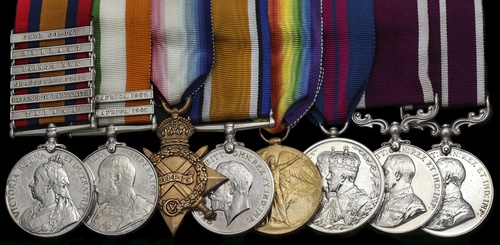
Auction: 17001 - Orders, Decorations and Medals
Lot: 195
(x) 'As Sergeant Ashfield gave the order to dismount, and the guns were unlimbering, our No. 3 called out, "Oh Joyce, I'm hit." I lifted him up and got him off to the camp. Then we formed a half-moon in front of the guns. Poor Ashfield was killed and very soon too the guns were beaten down by an overpowering fire … I took cover behind an ant-heap but it did not stop the bullet through my left arm, just a sharp twinge, that's all, not enough to stop me firing whenever I could get my man. They were now within 50 yards. I had visions of them of them rushing us and felt for my sword-bayonet. I had left it behind - the only time I had ever left any kit behind. A 'Regimental entry'? What a distraction in front of an enemy rush! However the loss of my sword saved my life, for I know that with it I would have stood up to attack. When the rush came I met an old fellow clean in the stomach and fell to the ground with a prayer for God's mercy … '
'Paddy' Joyce of the 1st K.R.R.C. Mounted Infantry Company, recalls his experiences at Bakenlaagte on 30 October 1901; Memoirs of a Rifleman Scout by Captain F. M. Crum, his old C.O., refers.
An outstanding M.S.M. group of eight awarded to Company Sergeant-Major F. J. 'Paddy' Joyce, King's Royal Rifle Corps, who was wounded by a gunshot in his left arm at Bakenlaagte on 'Gun Hill' in October 1901, whilst serving in the regiment's Mounted Infantry Company
Queen's South Africa 1899-1902, 6 clasps, Talana, Defence of Ladysmith, Orange Free State, Laing's Nek, Belfast, Cape Colony (542 Pte. F. Joyce, K.R.R.C.); King's South Africa 1901-02, 2 clasps, South Africa 1901, South Africa 1902 (542 Corpl. F. Joyce, K.R.R.C.); 1914-15 Star (542 C.S. Mjr. F. J. Joyce, K.R. Rif. C.); British War and Victory Medals (542 W.O. Cl. 2 F. J. Joyce, K.R. Rif. C.), the last of which with officially re-impressed naming; Delhi Durbar, privately inscribed, '542 Sgt. F. Joyce, 3 K.R.R.C.'; Army L.S. & G.C., G.V.R. (542 C.S. Mjr. F. L. Joyce, K.R. Rif. C.), note second initial; Army Meritorious Service Medal, G.V.R. (542 C.S. Mjr. F. J. Joyce, 5/K.R. Rif. C.), contact marks, edge bruising and polished, particularly the Boer War pair, these two fine, the remainder nearly very fine (8)
Francis James 'Paddy' Joyce was born in Belfast in January 1877 and enlisted in the King's Royal Rifle Corps in November 1897; he had earlier been an inmate of Caistor Union Workhouse in Lincolnshire.
Posted to the 1st Battalion in December 1898, he was embarked for South Africa, where he joined the battalion's newly formed Mounted Infantry Company in May 1899.
Joyce first saw action at the battle of Talana on 20 October 1899, following which a much fatigued 1st K.R.R.C. Mounted Infantry Company reached Ladysmith. The Company subsequently took part in the town's defence, including the actions at Farquhar's Farm and Wagon Hill; so, too, in the action at Laing's Nek and in numerous actions in Orange Free State and Cape Colony. Joyce was advanced to Lance-Corporal in September 1901.
His next action - nearly his last - was fought at Bakenlaagte on 'Gun Hill' on 30 October 1901, when he took a bullet in his left arm: on that occasion 17 men in his 20-strong detachment under Sergeant Ashfield were killed or wounded. Many years later - as cited above - extracts from one of Joyce's letters home were published in Memoirs of a Rifleman Scout, by his old C.O., Captain F. M. Crum. That letter continues:
'When the fight went on a young Boer gentleman came and squatted by me. I told him I longed for a smoke. He lit his own pipe and gave me a puff. All the time the fight went on. He told me he had graduated from Cambridge and that the ground we were on was his father's farm. On leaving he said, "Well Tommy, you have a saying, 'One good turn deserves another'." I said yes but I was in no position to return the goodness. He told me I was - all he wanted was for me to take a note to a women's laager in our camp with his message - 'All well. Piet van Nieman' - which I did in the dark on my way to the dressing station.'
Joyce was embarked with his comrades for Malta in September 1902 and, following a tour of duty in Crete in 1905-06, he was posted to Cairo. Advanced to Lance-Sergeant in November 1907, he was seconded to the Egyptian Army in the following year. Having then returned home in August 1909, he was advanced to Sergeant in the 1st Battalion.
Transferring to the 3rd Battalion in India in early 1911, Joyce was awarded the Delhi Durbar Medal and remained similarly employed until returning home in November 1914, when he was advanced to Colour-Sergeant.
In May 1915, he was drafted to the 13th Battalion, in which unit he was promoted to Company Sergeant-Major and embarked for France that July. A veteran of much trench warfare by the time of his return home in February 1916, Joyce ended the war as an instructor in the 5th (Special Reserve) Battalion at Sheerness.
He was awarded the L.S. & G.C. Medal in AO 33 of 1918 and received his immediate M.S.M. in the following year (London Gazette 16 October 1919, refers).
A stalwart supporter of his old regiment in retirement, 'Paddy' Joyce died at Winchester, Hampshire on 23 May 1936; sold with an extensive file of copied research from which the above biographical entry has been taken.
Subject to 5% tax on Hammer Price in addition to 20% VAT on Buyer’s Premium. For more information please view Terms and Conditions for Buyers.
Sold for
£1,600




